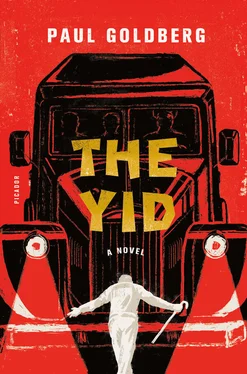* * *
After making rooster in the violinist’s brass bed, Tarzan rolls off Kent and falls asleep.
To avoid forming the impression that they are living like a man and a woman, Tarzan never talks after rooster. A long and rewarding day of adventure has come to an end.
There is a roof over their heads. Not just any roof, but a big log house full of oak furniture, crystal vases, even two verandas for drinking tea. Looking at a painting in the living room, Kent and Tarzan can see that the owner of the dacha is a nosed one, zhid , or at least an Armenian.
In bright aquamarine hues, it depicts a violinist facing a powerful wind gust, pointing his instrument toward its origin. A shock of white hair trails the entranced musician, then widens, smoke-like, behind him, flying off the canvas.
Since this is February, it doesn’t look like the musician will be returning soon, and if he does, Kent and Tarzan are going to make a run for it. A militia investigation would produce nothing.
Bottles, candy wrappers, and empty tins have accumulated next to their bed as evidence of prosperity and bliss. Kent likes to watch Tarzan unwrap hard candy with his strong, tattooed hands. The word “privet,” greetings, inked in unevenly between the knuckles of Tarzan’s right hand, is intended to be the last thing you see before you black out. The word “tovarischam,” to comrades, is squeezed in between the knuckles of his left hand. Viewed together, the two fists extend greetings to comrades.
Kent can’t resist reflecting on his life. Through his adolescence, he knew that he was born to hunt, to take everything he needed to sustain his life. His instincts have been tested in the streets, in prisons, on prison trains, in colonies for young criminals. He does well on his own, and when his skills are insufficient, he does the bidding of stronger, older men, which can involve sucking a wafer, bending over for rooster, or shaking down a political. Once, on a prison train, somewhere around Kalinin, he planted a sharpened carpenter’s nail deep in the neck of some intelligentik , a man who looked like the nosed violinist.
Though he was treated like an animal for most of his life, Kent is fully a human. Tarzan, who spits through his teeth, sends snot as projectiles through his nose, and defecates standing up, is a human as well. Indeed, Kent and Tarzan believe themselves to be more human than any nosed musician.
Animals may understand the concept of belonging to a pack, but the concept of motherland is beyond their reach. Kent and Tarzan passionately love their country, are proud to be part of the Great Russian People, and accept the burden of ruling the less significant peoples.
The ability to honor martyrs similarly distinguishes them from the animals. Kent and Tarzan revere Aleksandr Matrosov. In 1943, Matrosov covered a Nazi gunner’s pillbox with his chest, and this feat of bravery enabled his unit to carry out the commander’s order and capture a nearby village. For this, he was posthumously awarded the Gold Star Medal of the Hero of the Soviet Union.
Every Soviet citizen knows of Matrosov and his feat. Streets are named after him, as are schools and young pioneer palaces. Even the horrible colony for young criminals where Kent met Tarzan is called the Matrosov Colony for Underaged Criminals.
In the thirties, Matrosov, too, spent four years there for attempted theft. They said he tried to pick a pocket but was stopped. How is that possible? Either you pick a pocket or you don’t. Of course, he was railroaded, picked up for being a wandering, homeless youth like Kent and Tarzan.
At the colony, they said that Matrosov led a daring escape, digging a tunnel out of the furniture factory that operated in the zone. It would have worked, but somebody snitched. Even at the colony, Matrosov sacrificed himself for the good of all. Would a nosed one be capable of such a feat?
Is the motherland about to summon Tarzan and Kent for service as well? Will they get their chance to gum up the enemy guns with their fragile, tattooed bodies? Will they be given an opportunity to demonstrate their love for their people? Will they, too, bathe in blood and glory?
* * *
Kima Yefimovna Petrova is unable to fall asleep.
She lives in a corner of an eight-square-meter room, which she sublets from one of the many war widows in the barracks.
The corner is blocked off with an armoire and a curtain. Inside, there is room for everything Kima needs: a cot with a straw mattress; a cardboard suitcase atop a chair; a sack with laundry, which also serves as a hiding place for the thin, pamphlet-sized books lent to her by Kogan, most of which are banned; and, in the corner, another borrowed treasure — a pair of Finnish skis that she presumes belong to Kogan’s wife.
Her section of the wall is bare, except for a pinned photo of Zoya Kosmodemyanskaya, a Red Army commando who went out into the snowy night almost exactly eleven years ago to demolish a Nazi stable. She was captured, tortured, and hanged.
* * *
Railroad workers all over the USSR have a nickname for themselves —mazutniki, axle grease people. Heavy black grease saturates their clothing and covers their hands and faces. A worker at one of the depots of the Kazan railroad line is just as likely to call himself a negritos, a slang word for Negro. At nights, as negritosy in the barracks cook their grub, drink, quarrel, and curse the Jews, Kima finds peace by gliding through darkness in the woods, or — lately — alongside the gorge, within sight of the railroad tracks.
In the past, Kogan joined her. His skis are of American Lend-Lease vintage, put to good use in the war, then sold on the black market.
When they were side by side, they talked about literature, medicine, wars.
One evening, in the forest, at the base of a steep hill, Kogan recited Akhmatova:
It is good here: rustling and crackling;
It freezes harder every day,
The brush bending in a white blaze
Of dazzling, icy roses.
Taking a deep breath, he broke away, sprinting madly to the top, then slowing down, allowed her to catch up, then shouted out the rest of the poem:
And on the splendid, magnificent snow
There are ski tracks, like the memory of how,
In that somehow far-off century,
We passed this way together, you and I.
Some of his stories and most of his poems cause her chin to jut forward to that forty-five-degree angle that she thinks suppresses and disguises tears, yet Kima is always eager to join Kogan in the woods and, to Kogan’s amazement, never turns back when conversations cause pain.
Once, after a Sunday in the woods, Kima offered herself to him. It was a verbal offer, a gift, really.
“I am an admirer of a different sort,” he said, and quickly returned to Akhmatova.
She kissed him on the cheek, and he teared up when she left his house that night, and that was the full extent of their physical contact.
Kima is a formidable challenge for Kogan. He has no training in psychology or psychiatry. Everything he knows about Freud and psychoanalysis has to be gleaned from ideological screeds attacking this approach. Its focus on the individual, as opposed to class, is deemed anti-Marxist and therefore appeals to Kogan immensely. Interpretation of dreams in 1953 brings a death sentence.
Though Kogan has never seen Kima’s corner of the barracks, he would understand why the photo of Zoya hangs above her bed.
He would see the evolution:
In 1942, Kima would have wanted to be like Zoya, and by offering her life to the motherland, she would have hoped to demonstrate that, her enemy lineage notwithstanding, she was a patriot. She wanted her country to love her.
In 1953, it’s about something else: confronting evil and savoring martyrdom.
Читать дальше












